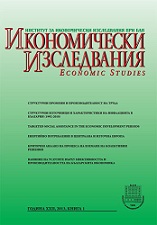Теория на публичния избор: критичен анализ на процеса на вземане на колективни фискални решения
Public Choice Theory: Critical Analysis of the Process of Making Collective Fiscal Decisions
Author(s): Georgi ManlievSubject(s): Economy
Published by: Институт за икономически изследвания при Българска академия на науките
Keywords: D7
Summary/Abstract: The paper presents the views of Buchanan on making collective fiscal decisions in conditions of simple majority, of the usefulness function of the politicians, bureaucrats and lobbies and the myopia in the behavior of the electors. He draws the conclusion that the fiscal decisions are ineffective, because they do not take into consideration the preferences of the electors. For overcoming this effect (defined by Arrow as theorem of impossibility of the society to reach effective collective decisions), Buchanan suggests introducing constitutional rights, which would make the public choice more effective. According to him, there are three different possible constitutions (on taxing, fiscal redistribution and money supply), or one Constitution, which includes tax, fiscal and monetary rules. To some or other degree, many countries have adopted fiscal and monetary rules in their Constitutions. After the crisis in 2008-2011, adopting fiscal rules is already considered an inevitable decision for achieving fiscal discipline and stability in the development of the different European countries and the Eurozone.
Journal: Икономически изследвания
- Issue Year: 2013
- Issue No: 1
- Page Range: 143-174
- Page Count: 32
- Language: Bulgarian

